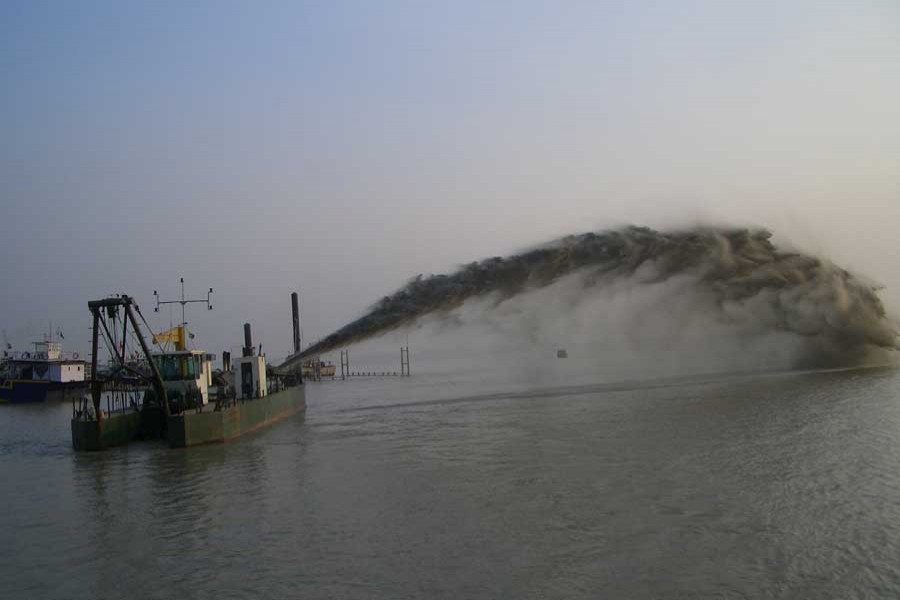Sand lifting from the river Turag on the outskirts of Dhaka has long been known as a blight afflicting large swathes of land. Massive dredgers and hundreds of labourers are used in extraction of sand, and loading boats and trawlers with it. The invincibility of the syndicates involved in the act at times defies credulity. They normally dodge regulations, and do not care a fig about punitive actions often taken by the authorities. With habitual arrogance, they continue to engage in their act, which has eventually resulted in the changes in the Turag's natural flow. Floods have become an annual occurrence in areas on the banks of the river. At the same time the syndicates fill the nearby lands; and wetlands and water bodies around the capital with the sand extracted. Apart from expediting Turag's choking, and, finally death, the unabated sand lifting spells an environmental doom for greater Dhaka. As seen in almost every sector, the illegal sand extractors are smoothly getting away with their acts of killing a high-stream river. The long arm of the law cannot reach them.
Another alarming aspect of sand lifting has lately started surfacing in the country. The criminals blessed by local influential people have swooped down also on the relatively small and obscure rivers. It is now happening all over the country. Unlike with the Turag case, people living on the banks of the smaller rivers invariably face erosion. Apart from establishments including homesteads and schools, the erosion badly hits farmlands. The riverside people in the affected areas are also hit by floods. These two scourges, erosion and flooding, recur every year --- especially during monsoon.
Extracting sand from the riverbed by questionable elements, both individually and in groups, has been largely unknown to the local people until recently. The sand lifted from the rivers is used for filling low-lying lands, ponds and ditches. Most of the time, the extracted sand is allegedly bought by Union Parishad members for different filling purposes. In cases, it's them who allegedly engage local youths in the illegal act.
However, the existence of sand lifting and trading syndicates is rampant in the country's remote areas. Finding the completely finished dredgers to be too expensive, many of them make use of improvised sand-lifting machines. With the rivers being narrow and of low depth, they make do with these dredging apparatuses. Moreover, their area of work, too, does not cover a wide area. But this doesn't cut down on the destructive impact of the illegal dredging. Unplanned sand lifting from river beds changes the course of a flow. The lands adjacent to a dredged out river thus bear the brunt. Upon being directed by higher authorities, the upazila administrations often assign mobile courts to the venues. As part of legal measures, they are seen taking stern actions against the sand lifters. In cases, they also burn down the dredging machines. But after a considerable gap the sand lifters resume their act with newly bought machines. A nearly insurmountable obstruction to taking effective steps against sand lifting and trading appears to be the local patronage. Vested interests of the areas concerned are infallibly found to be backing the syndicates. Vast sections of villagers, i.e. the erosion victims, are unanimous in stopping the dredging activities. To their great woes, they are buffeted by poverty and scores of deprivations. These people are mostly helpless and unable to muster enough courage to resist the sand mafias.
There is a silver lining though. Side by side with the increase in river grabbing and illegal dredging acts, conservationists focused on saving rivers and environment continue to emerge in greater numbers. Their presence could now be seen in every part of the country. Thanks to the promptly organised campaigns by them, many small rivers across the country could be made to escape death. Maybe, the activists appear to be helpless in the capital or big cities in the face of many urgent issues. But they are, in reality, a major factor in their localities. It is where they can fully concentrate on their issue and take their localised campaigns to the height of regional ones. Spontaneous participation of the victims of unlawful dredging is expected to add to the force of the campaign. Solely depending on mobile courts may not prove to be a wise step. Bangladesh has a dearth of fully equipped mobile courts, especially in the rural areas. Moreover, many remote areas have been inaccessible to administration people through the ages. Even changes in people's lifestyle and their vocal stance couldn't bring about noticeable improvements in the situation. Against this backdrop, involvement of the locally revered people in any river-saving drive conducted by mobile courts comes up as a prerequisite. That such widely participated administrative steps will create a great stir among the erosion victims doesn't need much elaboration.
Bangladesh at present has over 700 rivers including their branches. Few small countries in the world have so many rivers and their distributaries and tributaries. This large number of rivers has opened opportunities one after another for unscrupulous quarters to exploit these gifts of nature. The evil practices first began with rampant river-bank grabbing. Soon the grabbers began filling up the very rivers to set up various types of establishments. In fact, no major rivers nowadays can manage to remain unscathed by river-bank and river encroachers. On the other hand, environmentalists have always kept the small and largely unfocused rivers aside. Besides, due to their moribund state they remain out of the purview of national-level discourses. A vital fact seems to have escaped the notice of both the activists and the authorities concerned: the river-based syndicates may not find much grabbing-worthy bank left. But they do have river beds filled with sand, which is now a highly profitable commodity in Bangladesh. Unfortunately enough for the people living on their two banks, these rivers are struggling for survival on the margin of the list of important rivers of the country.


